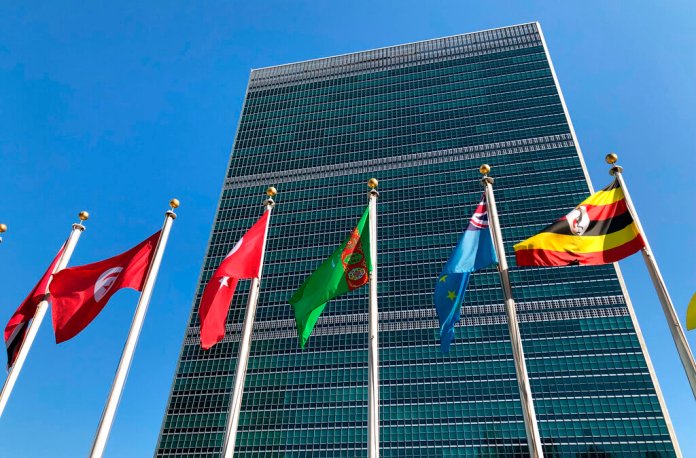The United Nations is approaching its 80th anniversary weaker and more hollow than ever. President Donald Trump captured a growing global impatience in his recent general assembly address by bluntly asking, “What is the purpose of the United Nations?” He ridiculed the institution for producing only “empty words” and accused it of “funding an assault on Western countries and their borders.” His central message to world leaders was unvarnished: “Your countries are going to hell.”
Days earlier, the secretary-general’s office released a draft 2026 budget amid a severe liquidity crisis. Although the overall budget is set to shrink by 15%, the burden falls disproportionately on junior staff, with cuts as high as 28% in some categories. By contrast, the top echelon remains nearly untouched, with only 3% of under-secretary-general posts eliminated (two out of 58). This reveals not reform but protection of a privileged class, exposing a leadership unwilling to confront entrenched interests.
TRUMP’S AMBITIOUS GAZA PEACE PLAN IS FRAUGHT WITH COMPLEXITY
The justification — that the “timing of the UN80 revised estimates precluded major restructuring” — is a hollow excuse. The real problem is a failure of leadership. The U.N. cannot claim to defend equity while shielding its top officials, who enjoy tax-free salaries and generous perks. Senior posts have long functioned as political fiefdoms for powerful member states, resistant to any reform that might dilute their influence.
The outcome is predictable: a U.N. that is increasingly top-heavy, bureaucratic, and ineffective. Staff unions have warned that these measures will make the institution “less responsive” to global needs. The very people responsible for implementing its mandate are sacrificed, while a sclerotic leadership class remains intact.
This culture of unaccountability extends far beyond headquarters. Field operations have been plagued by mismanagement for decades, while senior appointments, from department heads in New York to special envoys, are treated as political bargaining chips rather than assignments based on competence. Too often, these posts serve as rewards for loyalty or as retirement packages for national officials rather than positions designed to resolve complex crises.
As Yemen‘s former foreign minister and permanent representative to the U.N., I witnessed firsthand the tragic results of this dysfunction. For 15 years, the U.N.’s engagement in Yemen has been a study in futility. Despite hundreds of millions of dollars spent on the Office of the Special Envoy and other monitoring missions, the conflict remains unresolved. The U.N. produced endless statements and reports, but these never translated into a sustainable political settlement. Instead, missions became self-perpetuating bureaucracies, functioning more as employment schemes for expatriate staff than as engines of peace. The Yemeni people continue to pay the price for the UN’s failure.
In an era defined by the speed of artificial intelligence and renewed great-power competition, the world needs a nimble, transparent, and effective global body. The U.N., stuck in 20th-century structures, is instead proving incapable of even modest reform. Its much-touted “UN80” initiative has turned out to be a smokescreen — an exercise in cosmetic cost-cutting meant to appease donor states without touching the privileges of its elite. Promises of future senior-level reforms remain empty words, without timelines or accountability.
This failure of leadership has corroded confidence even inside the organization. An internal survey conducted in August revealed that fewer than 20% of staff have confidence in U.N. Secretary-General António Guterres, and fewer than 10% believe the reforms undertaken so far are sound. These statistics represent more than discontent; they expose a crisis of legitimacy at the institution’s core.
The U.N.’s finances are strained as major democracies, led by the United States and Europe, which together provide more than 45% of its regular budget, have withheld contributions in protest against its ineffectiveness and corrupt bureaucracy, leaving the secretary-general pleading for funds.
MANCHESTER ATTACK UNDERLINES EUROPE’S ANTISEMITIC TERRORISM CHALLENGE
Any reform that spares the top is a charade. The current trajectory hollows out the operational base, undermining younger staff and bleeding talent, while preserving a culture of privilege and patronage at the summit. Unless the U.N. confronts this reality, it risks drifting into irrelevance, reduced to a globally funded humanitarian agency with little geopolitical weight.
The choice before Guterres is stark: launch genuine, top-down reform that purges the politically appointed elite and restores credibility or step aside for someone with the courage to lead the institution into a perilous new era. Without such a transformation, the U.N. may become less an instrument of humanity’s salvation than a burden on it.
Ambassador Khaled Alyemany was the foreign minister of Yemen from 2018 to 2019, permanent representative of Yemen to the United Nations from 2015 to 2018, and is currently a nonresident senior fellow at the Atlantic Council.
, 2025-10-05 10:00:00,  , Washington Examiner, %%https://www.washingtonexaminer.com/wp-content/uploads/2023/11/cropped-favicon.png?w=32, https://www.washingtonexaminer.com/feed/, Khaled Alyemany
, Washington Examiner, %%https://www.washingtonexaminer.com/wp-content/uploads/2023/11/cropped-favicon.png?w=32, https://www.washingtonexaminer.com/feed/, Khaled Alyemany
